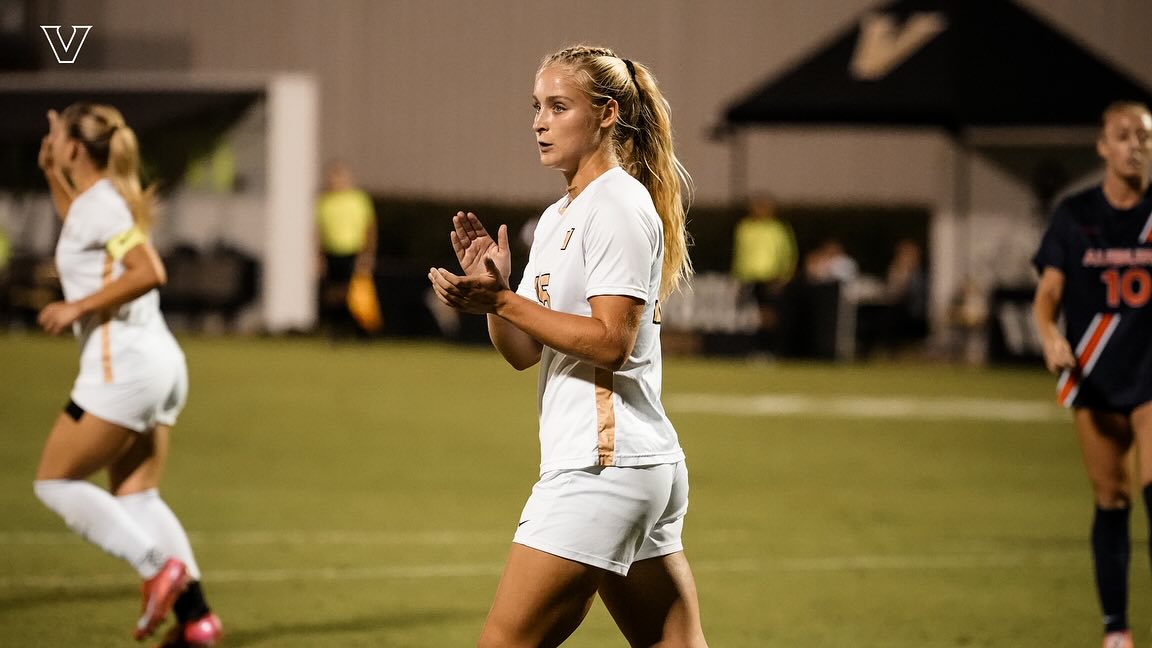NASHVILLE — Sydney Watts didn’t instigate one of the earliest goal celebrations she can recall. Oh, sure, she scored the goal in question. The 2025 SEC Forward of the Year has always had a knack for doing that. But at least as Watts remembers the now-distant youth soccer event, it was her mom, a former collegiate soccer player in her own right, who ran onto the field to hug her daughter before play resumed.
Anyone who has hugged a stranger, thrown a beverage in the air or yelled until they’re hoarse after their team puts the ball in the back of the net can empathize. Goals move people to uncommon emotions. And few people in a Vanderbilt uniform—only one this century—have scored them more regularly than Watts this fall. With 14 goals entering Vanderbilt’s NCAA Tournament second-round game against Clemson, the junior not only leads all SEC players this season but is tied for sixth in program single-season history.
Watts, of course, didn’t set out to break records. Once upon a time, scoring goals was more of a survival mechanism. She grew up playing mostly as a central midfielder, pulling the strings and setting up those around her. But as she climbed the ladder of elite club soccer, she found the depth chart crowded. She’d run all the sprints and put in all the necessary hours in practice, only to end up playing a handful of mop-up minutes at the end of games.
During one showcase tournament bringing together clubs from across the country, her team was short a center forward—a No. 9, in soccer parlance. She played and scored. When she kept scoring in subsequent games, she kept playing. (Interestingly, a basketball junkie who briefly entertained the thought of playing that sport in college, she made a similar hardwood progression from point guard, setting up others, to scoring guard.)
The newly-minted striker got everyone’s attention. A two-time Kansas Gatorade Player of the Year at St. Thomas Aquinas in the Kansas City area, she once scored 37 goals in a high school season. She picked Vanderbilt because it offered a chance to compete at the highest level for the biggest prizes, but also because it was just about the only school that made visiting a classroom as much a part of her official visit as the soccer facilities.
“You can’t just skate your way through Vanderbilt, and that is something that students here take a lot of pride in,” Watts said. “There’s a reason that at some point we’re going to have a degree with the Vanderbilt name on it. That’s a really special thing. And I’m lucky enough to be here because there are probably a lot of girls who wish they were in my shoes.”
As an homage to Vanderbilt Magazine’s expertise section, where students, alumni and staff with particular skills share their knowledge of everything from running marathons to reading poetry, we turned to Watts to learn the essentials of being the SEC Forward of the Year.
Make the offseason count
Watts enjoyed a breakout sophomore season, starting 20 games and tying for the team lead with nine goals. After logging more than 1,300 minutes, she then gave herself the grace of a break. She didn’t touch a ball for two weeks, keeping to a fitness routine so that she didn’t go back to square one with her conditioning but otherwise winding down.
“I give myself that time mentally so that when I do come back into the game, I’m excited, ready to go and ready to embrace failure so that I can learn how to do new things,” she explained.
She focused throughout the summer on playing more assertively. Too often, she felt, she took the safe route and played the ball backward from the top of the attack. Training and playing against other NCAA Division I student-athletes at home in the Kansas City area, she worked on turning and facing up when she received the ball, forcing defenders to react.
Understand a goal is almost never a solo
Eight Commodores have at least one primary assist on a Watts goal this season, testament to both the team’s passing and the All-SEC forward’s ability to play to their strengths.
She has learned, for example, that freshman Olivia Stafford, whether playing up top or in a wide role, loves to take on defenders on the dribble. Any time Watts sees Stafford get the ball in space, the older player clears out and heads for the other side of the box, letting the freshman do her thing and making herself available when flummoxed defenders overcommit. Stafford leads the team with eight assists, including three of the primary variety on Watts goals.
Similarly, whether Reagan Pentz is playing as a No. 10 or increasingly as a forward, Watts understands the foot skills that let her teammate turn on a dime and the creative instincts that mean she must be ready for a pass at any moment. Pentz has six assists, two as primary assists to Watts.
And on it goes, from Maci Teater to Courtney Jones and more. Being a goal scorer doesn’t just mean knowing what you’re going to do with the ball. It means understanding what everyone else is going to do with the ball and trusting them to know what you need.
“Front foot, into space, that’s exactly what I want,” Watts said. “And I think them knowing that, too, elevates our game because we know where each other wants the ball and what they might do next with it. That’s huge because the other team has no clue. They can guess, but if they guess wrong and I guess right, well, now we’re in. We’re looking for those balls, looking for those opportunities, and things are bound to work out if we continue to do that.”
Trust your instincts
As her recruiting experience suggests, Watts is no slouch in the classroom, either. She already earned SEC academic honors in each of her first two seasons. But you can’t create the perfect goal with a slide rule, pen or philosophical treatise. Playing forward is about living in the moment and trusting all those hours on the practice field to take control.
“If you overthink it, you hurt yourself more than you help yourself,” Watts said. “If there’s a through ball and I look up and the keeper’s coming at me, I can’t act like I’m taking a quiz and it’s a multiple choice question: ‘Where should I put the ball? A) chip her. …’ There isn’t that much time in those moments. I wish there was. It would make my job a lot easier.”
Part and parcel of this is what Watts describes as the “goldfish mentality.” As much of a perfectionist as she may be, if she expends energy thinking about the first touch that got away, the post that got in the way or the goalkeeper who robbed her, it only increases the likelihood of letting the next chance slip away.
Don’t judge yourself by goals alone
Whether you’re Erling Haaland, the recently retired Alex Morgan (Watts’ childhood favorite) or the SEC’s best, strikers’ reputations rise and fall with goals. It comes with the territory.
It isn’t just the outside world. Watts expects goals from herself. She thinks she should finish every chance that comes her way (all right, she grudgingly concedes, 98 percent of them). But sometimes being a great forward means being great at not scoring goals.
Watts can help her team’s cause with her defensive work, serving as the first line of the press to win the ball back and keep opponents off balance. Even more than that, she can serve as one of the SEC’s most overqualified decoys. The old axiom, originally courtesy of Wayne Gretzky’s dad rather than the hockey legend himself, is that you miss 100 percent of the shots you don’t take. But when every defender on the field has to be aware of every step she takes and run she makes, Watts can unlock a goal without ever touching the ball.
“My movement, if I make it fun, it creates really good opportunities and chances for us to score or get in really good parts of the field,” Watts said. “It’s knowing that if I keep moving, keep trying little things—whether they work or not—I’m going to move the defense. There’s lots of things that movement off the ball can accomplish that won’t show in a box score.
“Maybe I make a run front post and it leaves someone wide open back post. You’re not going to see a goal or an assist for me, but you know what? I don’t care because our team just won.”
Appreciate the power of a good nap
Soccer’s best known “five-second rule” probably belongs to Manchester City manager Pep Guardiola, who wanted his teams of a certain vintage to win back control of the ball within five seconds of the other team gaining possession. Watts’ five-second rule is a little different, geared toward balancing the demands of a world-class academic institution and SEC soccer. In the rare moments between classes, study sessions, practices and games, she values nothing more than a nap. But to keep sleep from overrunning the rest of her day, she forces herself to get both feet out of bed within five seconds of her alarm going off.
“If you don’t get out of bed in those five seconds, it is so freaking hard,” Watts said of the temptation to check notifications, texts and all the distractions of the modern age. “That is going to put you into a black hole. I’ve even changed the ring tone for my alarm—it is like a heart attack waiting to happen. When it goes off, quite honestly, I have to jump out of bed.”








